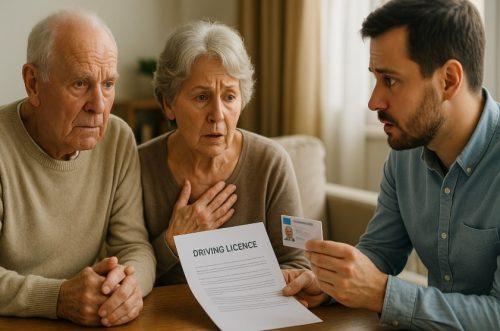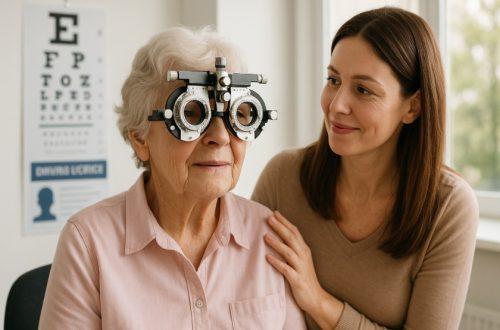|
Getting your Trinity Audio player ready...
|
Driving is more than just a mode of transport, especially for people over 70 in the UK. It symbolises freedom, independence, and a lifeline to community, healthcare, and family life.
But starting from 1 October 2025, new updates to the UK’s senior driving licence rules will affect how you keep that independence. These changes are meant to balance the needs of elderly drivers with the broader goal of road safety.
If you’re aged 70 or approaching that milestone, it’s crucial to understand how these changes will impact you. The upcoming rules will include enhanced medical checks, vision requirements, and the introduction of digital licences.
This blog explains everything you need to know in simple, easy-to-follow steps so you can stay safe, legal, and confident on the road.
Why Are UK Driving Licence Rules Changing for Seniors?

The UK’s driving laws for older citizens are changing to adapt to the country’s ageing population and the increasing need to protect road safety for all users.
With thousands of drivers now aged 70 or older, the government recognises the importance of ensuring that those still driving are medically fit and confident behind the wheel.
Many elderly individuals continue to drive safely. However, natural age-related changes can affect reaction times, coordination, eyesight, and decision-making.
These issues are not about blaming age but recognising that additional support and checks can help keep everyone safe on the road. The Department for Transport, through the DVLA, aims to create a safer and more efficient licensing system.
The rule changes are not designed to remove licences unnecessarily but to ensure that:
- All older drivers can continue driving if they’re fit and capable
- Regular updates on health and vision are provided
- There is better use of modern technology, like digital licences
The revised policies are built on:
- Medical evidence from the NHS and health organisations
- Road safety data linked to health-related accidents
- Feedback from public consultations and driving safety experts
In summary, the changes aim to keep roads safe while helping older people retain their mobility and independence for as long as possible.
What Are the Current Driving Licence Rules for Over-70s?
If you are aged 70 or above in the UK, current driving laws require you to renew your licence every three years. This process is straightforward, free of charge, and primarily based on your self-declaration of medical fitness to drive.
At present, the renewal process includes:
- Completing a DVLA D46P renewal form or using the online system
- Declaring that you meet the required health standards
- Confirming that your eyesight meets the legal criteria
No formal medical tests or eye examinations are automatically required unless a medical condition is declared. Drivers are expected to take responsibility for disclosing any issue that may affect their ability to drive safely.
Conditions that should currently be reported to the DVLA include:
- Eye conditions affecting vision
- Neurological illnesses like dementia or Parkinson’s
- Epilepsy or frequent seizures
- Cardiovascular issues
- Reduced mobility impacting driving ability
The DVLA may investigate further if any declared conditions raise safety concerns, and they could require a GP report, specialist assessment, or impose temporary driving restrictions.
These rules have worked well so far in balancing safety and independence. However, gaps in self-declaration, missed conditions, and increasing health risks with age have led to the more structured changes coming in October 2025.
What Will Change from 1 October 2025?

From 1 October 2025, updated rules will apply to all drivers in the UK aged 70 and above. These changes are designed to modernise the renewal process and introduce more health-based checks, while still allowing safe and confident drivers to remain on the road.
Here is a detailed breakdown of what will change:
1. Mandatory Proof of Eyesight
One of the most significant changes is the introduction of mandatory proof of vision standards. Previously, elderly drivers only had to self-certify that they could meet the requirement of reading a number plate from 20 metres away. This will now require optician confirmation.
The new requirements include:
- Submitting proof of a recent eye test with renewal applications
- Ensuring the vision meets the legal driving standard
- Acceptable proof includes a report or certificate from a licensed optician
This move aims to reduce accidents caused by undiagnosed vision problems, which are increasingly common among elderly drivers. By requiring professional confirmation, it improves safety without adding excessive difficulty to the renewal process.
2. Updated Medical Declarations
The 2025 changes will also expand and clarify the list of medical conditions that must be reported during licence renewal.
Drivers will now be required to:
- Complete a more detailed health questionnaire as part of the renewal process
- Declare specific conditions, including diabetes, sleep apnoea, heart disease, and neurological issues
- Undergo a GP or specialist assessment if the DVLA determines it is necessary
Failure to report relevant conditions could lead to:
- Legal consequences such as fines
- Licence suspension or cancellation
- Driving while unfit can invalidate insurance and result in further penalties
These steps are not designed to remove licences but to ensure that elderly drivers are equipped and safe to handle road demands.
3. Digital Driving Licences
Another major update is the automatic issuing of digital driving licences for drivers renewing after 1 October 2025.
What to expect:
- A digital licence will be provided by default during renewal
- It will be accessible through a smartphone app or secure online portal
- The physical licence card remains available on request for those who prefer traditional methods
The digital licence system offers several benefits:
- Easier access to renewal reminders
- Instant updates for address or medical information
- Simple presentation during checks
This aligns with the government’s push towards digital services while keeping accessibility in mind for seniors who may not be comfortable with smartphones.
4. Optional Refresher Courses
To support driving confidence, especially for those who may not drive frequently, voluntary refresher courses will be encouraged.
Key points include:
- Courses will be organised by local councils and road safety groups
- Sessions may cover current driving laws, navigating new vehicle technologies, and hazard perception
- Participation is voluntary but highly recommended for drivers who feel less confident or have taken a break from driving
These courses are not tests. They are designed to be supportive and educational, offering practical advice for staying safe and comfortable on the road.
At-a-Glance Summary of Key Changes from October 2025
| Area of Change | Current Requirement | From October 2025 Update |
| Vision Checks | Self-declaration of eyesight | Proof from optician required |
| Medical Declarations | Basic conditions disclosed voluntarily | Detailed list and mandatory reporting |
| Driving Licence Format | Physical photocard issued | Digital by default, physical optional |
| Refresher Courses | Not officially offered | Voluntary courses encouraged via councils |
| Renewal Reminders | Sent by post | Sent via post and digital channels |
These changes offer a comprehensive approach to ensure older drivers are both supported and assessed fairly.
Step-by-Step Renewal Process After October 2025

Starting October 2025, the renewal process for driving licences for seniors aged 70 and over will follow a more structured format. While the core requirement of renewing every three years remains unchanged, additional steps will ensure better validation of health and vision fitness for continued safe driving.
Drivers will still be able to choose between renewing online through the official DVLA portal or by using a paper-based postal application. Regardless of the method, the new process involves a set of essential steps aimed at increasing safety and compliance.
Here’s what you’ll need to do:
- Confirm your eyesight meets the legal standard with a recent optician’s report
- Declare any medical conditions honestly through a detailed checklist
- Provide any requested supporting documentation from your GP or specialist
- Choose whether you want a digital or physical driving licence
- Submit your renewal application either online or by post
Once submitted, the DVLA will process your application and may follow up if any conditions require further assessment. Renewal reminders will be sent through both email and postal methods, giving drivers ample time to act. Overall, the process is designed to be clear, secure, and inclusive for all older drivers while prioritising road safety.
How the Changes Affect Senior Drivers?
For many senior drivers, these new regulations might feel like a significant shift. However, for the majority of healthy and responsible drivers, the changes will involve minimal extra effort. The aim is not to restrict but to provide a framework that supports longer and safer driving for older citizens.
Here’s what the changes mean in practical terms:
- You’ll need to pay for an eye test to provide official vision proof
- The renewal form will include more health questions, so preparation is helpful
- If a medical condition is declared, further checks may be necessary before approval
- Most healthy drivers will still receive a full three-year renewal with no restrictions
- Optional refresher courses can help rebuild confidence and keep driving skills sharp
The introduction of digital licences adds convenience, especially for managing updates or accessing licence information on the go. Still, the option for a physical licence remains available for those who prefer it. Overall, these updates aim to make elderly driving safer while enabling as many people as possible to remain independent and mobile.
What Happens If You Don’t Renew?
If you are aged 70 or over and fail to renew your licence, you risk serious legal and financial consequences. Driving without a valid licence is illegal in the UK and could result in fines or even prosecution in the event of an accident.
Here’s what could happen if you miss your renewal:
- Your insurance becomes invalid, meaning no coverage in case of an incident
- You may face fines and legal penalties for driving without a valid licence
- Your vehicle could be impounded if stopped by the police
- Renewal may take longer if delayed past the expiration date, leading to a period where you’re not allowed to drive
The DVLA will send reminders before your licence expires, and from October 2025, those reminders will also come in digital format via email or mobile apps. It’s crucial to act promptly once you receive these notices to avoid driving illegally.
Being proactive ensures your freedom on the road continues without interruption and protects both you and other road users.
Preparing for the October 2025 Deadline

Getting ready for the new rules doesn’t need to be stressful. In fact, most of the preparation involves simple tasks that help ensure a smooth transition into the new renewal system.
Here’s how to prepare effectively:
- Book an eye test at a certified optician ahead of your next renewal date
- Collect documentation related to any medical conditions you currently manage
- Familiarise yourself with the DVLA online renewal portal
- Speak with your GP if you’re unsure whether your health could affect your driving
- Ask a family member or friend to assist with online forms if needed
Planning early helps avoid delays or missed deadlines. The transition is designed to be user-friendly, and the government is providing both digital and physical channels for renewals. You are encouraged to stay informed through official updates and take part in optional courses if you’ve been off the road for a while.
A little preparation now can save time and stress in the future and keep you driving safely beyond 70.
Support Options for Elderly Drivers in the UK
Navigating new rules can be daunting, especially when it involves your independence. Thankfully, several support services exist to help elderly drivers manage the changes and stay road-ready.
Here are some reliable resources:
- Age UK: Offers advice on medical declarations, renewing licences, and managing age-related driving concerns
- RoSPA (Royal Society for the Prevention of Accidents): Provides voluntary refresher driving courses tailored for older drivers
- NHS: Offers assessments for vision, cognition, and mobility to determine driving fitness
- Local Councils: May offer discounted courses, driving evaluations, and help accessing digital tools
Support also includes consultation with your GP. If you have a condition that you think might affect your driving, your GP can provide advice and documentation required by the DVLA.
You’re not expected to manage this process alone. These services are there to help you understand your rights, responsibilities, and options under the new rules.
Summary of Driving Licence Changes
To make things easier to understand, here is a summary table comparing the current system with the changes that will come into effect from 1 October 2025. This breakdown helps identify what’s staying the same and what will be different.
| Change Category | Current Rules | New Rules from October 2025 |
| Licence Renewal Age | Must renew at age 70, then every 3 years | No change |
| Medical Declarations | Voluntary self-reporting | Mandatory reporting with detailed questions |
| Vision Confirmation | Self-declaration only | Proof required from optician |
| Digital Licences | Not available | Digital version issued by default |
| Refresher Courses | Not provided | Voluntary courses encouraged for over-70s |
| Renewal Method | Online or post | Online, post, and mobile app options |
| Renewal Cost | Free (no test cost) | Still free, but eye test cost is separate |
| Driving Test Requirement | No test needed after 70 | No test needed |
This comparison makes it clear that while the system is evolving, the changes are not overly restrictive. They aim to support elderly drivers with clarity, safety, and freedom of movement.
Conclusion
The upcoming changes to the UK driving licence rules for seniors are not here to make life harder. They are built around protecting your independence while enhancing safety on the roads.
Whether it’s proving your eyesight, reporting a health condition, or renewing your licence digitally, every new requirement has a clear purpose. If you prepare early, the process will be smooth and manageable.
With support from trusted organisations and access to voluntary refresher courses, you’ll be in a better position to keep driving confidently. These changes don’t signal the end of your driving journey, but rather ensure it continues with the care and attention you deserve.
FAQs
Do I have to stop driving at age 70?
No, you can continue driving as long as you renew your licence and remain medically fit to drive.
Will I need to take a driving test after 70?
No driving test is required. You only need to renew your licence every three years and meet medical and eyesight standards.
Is the driving licence renewal still free?
Yes, the renewal process is free, but you may need to pay separately for an eye test with an optician.
Can I get a physical licence instead of digital?
Yes, while digital licences will be the default, you can still request a physical photocard if you prefer.
What if I forget to renew my licence?
Driving with an expired licence is illegal and can result in fines and invalid insurance. Renewals must be done every three years.
What if I have a health condition affecting my driving?
You must declare it when renewing your licence. The DVLA will assess your fitness to drive and may request more medical information.
Where can I find help for the renewal process?
Support is available from Age UK, local councils, your GP, and the DVLA. You can also ask family members for digital help.








